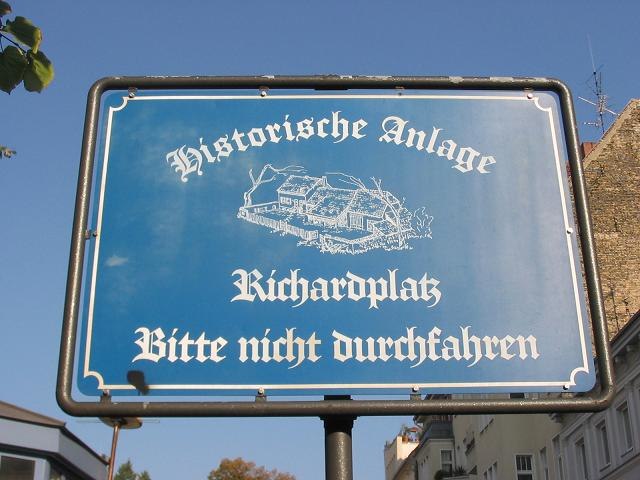Earlier this month, Berlin’s biggest tabloid, B.Z., splashed a warning across its title page: “RISK OF DEATH”. This mortal danger was right in my neighborhood! But what merited an all-caps warning?
If you walk around the southern part of North Neukölln, the danger is obvious: cars. Up to 4.000 cars were hurtling over the once-tranquil Richardplatz every day, past day cares and elementary schools. Cars aren’t just dangerous when they hit someone. Their tires produce even more deadly pollution than their exhausts do. Their noise in residential areas also significantly shortens life expectancy. Their carbon emissions cause floods, droughts, and other deadly catastrophes.
But it seems as B.Z. doesn’t want you worrying about any of that. No, their concern is about a handful of bollards installed by the Neukölln district council on August 21 and 27. This “Kiezblock” (neighborhood block) is designed to prevent cars taking shortcuts past our homes in Rixdorf. The tabloid claims these will block firetrucks in an emergency.
It might seem superfluous to point out that a publication from the Axel Springer Company is bending the truth. But briefly: Kiezblocks are safe. The fire department has keys to remove the bollards in a few seconds if necessary. They were consulted as the Kiezblock was being planned. What actually blocks emergency vehicles in Berlin? Not bollards, but illegally parked cars.
We also read that “there was no civic engagement”. Yet the Kiezblock was voted on more than three years ago! There have been numerous public meetings and demonstrations. In a column from almost two years ago, I made no secret of my impatience with the bureaucracy’s foot-dragging.
This was a tiny example of the right-wing moral panics Berlin goes through regularly. A Springer publication starts something that seems like a misinformation campaign – which then gets taken up by SPD politicians and supposedly serious publications as the supposed “voice of Berlin”.
The truth is that the Kiezblock has been immensely popular. A spokesperson of the Neukölln district council said that “the majority of residents welcomes” the measure. I can confirm this: I surveyed my neighbors and 91 percent rated the Kiezblock as “gut”.
Who has been angry? Drivers who were used to speeding past our home. But drivers are often angry – studies show that driving is far more stressful than taking the train. Drivers will often say they love their cars, even as their faces are twisted in rage.
I have been wondering: Are cars like an addiction? I used to smoke, and like the majority of people who kicked the habit, I wish I had never started. I needed to get away from cigarettes for a few months to recognize they are harmful and kinda disgusting.
At the moment, many Berliners believe they could never live without cars. But what would happen if they got to experience a city made for people? I imagine, before long, we would look back with shame and revulsion about a time when cars dominated our streets – just like when we imagine people smoking in hospitals and day cares.
Ljubljana made its inner-city car-free back in 2008. Despite some protests at first, the measures are now supported by 95 percent of residents. Once people start to experience a car-free city – where kids can play on the street and neighbors can hang out – it’s hard to go back.
Most people in Berlin can get around with bikes, trams, trains, and buses. All of these systems need massive investment – we need billions for public transit instead of new Autobahns. People with reduced mobility deserve to be transported at the city’s expense. But no one needs a two-ton metal box that is capable of going 300km/h to get around. Anyone who really needs a car can do just fine with a golf cart with a top speed of 20km/h. This would leave space for essential vehicles – ambulances, fire trucks, and last-mile deliveries – to get to their destinations easily.
If B.Z. were interested in reducing the risk of death in Berlin, they would be campaigning to get rid of cars.
This is a mirror of Nathaniel’s Red Flag column for Neues Deutschland




